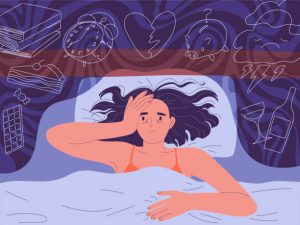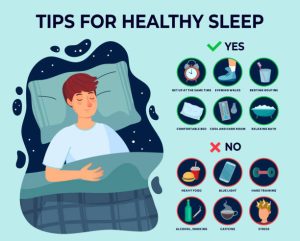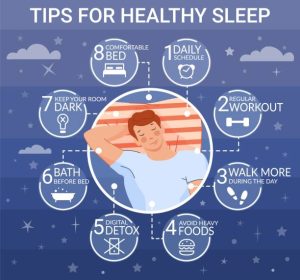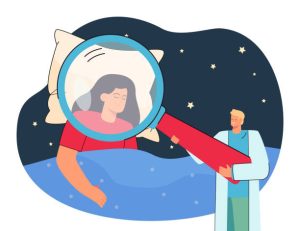Table of Contents
ToggleGetting enough sleep is essential for maintaining good physical and mental health.
Insomnia, defined as difficulty falling or staying asleep, can have a significant impact on an individual’s well-being. Chronic sleep deprivation caused by insomnia can lead to a range of health problems, including an increased risk of obesity, heart disease, and diabetes. Insomnia can also negatively affect mental health, contributing to anxiety and depression.
In addition to its impact on physical and mental health, insomnia can also hurt a person’s day-to-day life. It can make it difficult to concentrate, impair decision-making abilities, and reduce overall productivity. It can also affect mood, leading to irritability and a lack of motivation.
Understanding the Science of Sleep: Circadian Rhythm, Sleep Stages, and Melatonin

Did you know that understanding the science of sleep is as important as having a healthy diet? Yep, you read it right!
And one of the coolest things about sleep is the circadian rhythm – a fancy biological process that regulates the sleep-wake cycle over 24 hours. It’s like an internal clock that keeps ticking even when you’re dead tired! But be careful not to mess with it too much, or you might end up with a case of dreaded insomnia or jet lag. So, make sure to keep your circadian rhythm in check, and you’ll be one step closer to being the sleeping beauty of your dreams!
The Circadian Rhythm
The circadian rhythm is a biological process that regulates the sleep-wake cycle over 24 hours. It is influenced by external factors such as light and temperature, as well as internal factors such as hormones and genetics.
Disruptions to the circadian rhythm can result in various sleep disorders such as insomnia and jet lag. Understanding the circadian rhythm is important for maintaining good physical and mental health.
Sleep Stages: Different Phases of Sleep
Sleep is divided into different stages, each characterized by different brain wave patterns and physiological changes. Stage 1 is a transitional stage between wakefulness and sleep, while stage 2 is a deeper form of sleep where the body temperature drops and the heart rate slows down. Stages 3 and 4 are the deepest stages of sleep, also known as slow-wave sleep, where the brain waves become even slower and it is difficult to awaken from sleep.
Rapid eye movement (REM) sleep is a unique stage of sleep where the eyes move rapidly and dreams occur. The cycle of sleep stages repeats several times throughout the night, with each cycle lasting around 90 minutes. Understanding the different stages of sleep can help individuals identify and address sleep problems.
Melatonin: The Hormone that Regulates Sleep
Melatonin, a hormone produced by the pineal gland in the brain, plays an important role in regulating the sleep-wake cycle. Melatonin levels increase in the evening as darkness sets in, signaling to the body that it is time to sleep. Melatonin levels decrease in the morning as light exposure increases, signaling to the body that it is time to wake up.
Melatonin supplements are sometimes used to treat sleep disorders such as insomnia, but it is important to use them under the guidance of a healthcare professional as they can have side effects and may interact with other medications. Understanding the role of melatonin in sleep can help individuals improve their sleep quality and quantity.
Factors Affecting Sleep: Lifestyle and Environmental Factors
In addition to the circadian rhythm and melatonin, many other factors can influence sleep quality and quantity.
These include lifestyle factors such as diet, exercise, and stress management, as well as environmental factors such as noise and temperature. Sleep disorders such as sleep apnea and restless legs syndrome can also disrupt sleep and lead to daytime sleepiness and other health problems.
Understanding the various factors that affect sleep can help individuals take steps to improve their sleep habits and overall health.
Identifying the Causes of Sleeplessness

Sleeplessness, also known as insomnia, is a common condition that affects millions of people worldwide.
Identifying the causes of sleeplessness is crucial to find appropriate treatment and improving the quality of life for those affected. Several factors can contribute to sleeplessness, including physical and environmental factors, psychological factors, and medical conditions.
Physical and Environmental Factors
Physical and environmental factors can significantly affect sleep. For example, uncomfortable sleeping conditions such as an old mattress, noisy surroundings, or extreme temperatures can make it difficult to fall asleep or stay asleep.
Consuming caffeine or alcohol before bedtime, irregular sleep patterns, and physical discomfort or pain can also disrupt sleep. Addressing these physical and environmental factors can often be the first step in addressing sleeplessness.
Psychological Factors
Psychological factors, such as anxiety, stress, and depression, can also cause sleeplessness. People who experience high levels of stress or anxiety often have trouble falling asleep or staying asleep. Similarly, depression can affect sleep by causing a person to sleep too much or too little.
In addition to these conditions, other psychological factors such as grief or trauma can also impact sleep. It is important to address these underlying psychological factors to improve sleep quality.
Medical Conditions
Medical conditions can also cause sleeplessness. Sleep apnea, a condition in which breathing is briefly interrupted during sleep, can significantly affect sleep quality. Restless leg syndrome, a condition characterized by an irresistible urge to move the legs, can also disrupt sleep.
Other medical conditions that can cause sleeplessness include chronic pain, asthma, and acid reflux. Identifying and treating these underlying medical conditions can greatly improve sleep quality.
Benefits of Having a Bedtime Routine

Establishing a consistent bedtime routine can provide numerous benefits to your overall health and well-being. By preparing your body and mind for rest and relaxation, you can improve the quality of your sleep and wake up feeling more refreshed and energized.
Some of the key benefits of having a bedtime routine include better sleep quality, improved mood, and increased daytime energy levels.
Examples of Bedtime Routines
Many different types of bedtime routines can help promote relaxation and better sleep. Some examples include reading a book before bed, taking a warm bath or shower, practicing relaxation techniques such as deep breathing or meditation, or listening to calming music or nature sounds.
It’s important to find a routine that works best for you and stick with it consistently.
Tips for Creating a Bedtime Routine
If you’re looking to establish a bedtime routine, there are a few tips that can help you get started. First, try to establish a consistent bedtime and wake-up time, even on the weekends. This will help regulate your body’s internal clock and make it easier to fall asleep and wake up naturally.
Next, eliminate any distractions that may be keeping you awake, such as electronic devices or bright lights in your bedroom. Instead, opt for soft lighting and soothing sounds to create a calm environment. Finally, consider incorporating relaxation techniques into your routine, such as deep breathing exercises, progressive muscle relaxation, or meditation.
How to Create a Sleep-Inducing Environment

Creating a sleep-inducing environment is crucial for a good night’s rest. The following steps can help you create a sleep-friendly bedroom:
Address Noise and Light Sources
Invest in heavy curtains or blinds that can block out streetlights or early morning sunlight. Use earplugs or a white noise machine to mask any unwanted noise, such as traffic or barking dogs.
Consider Temperature
The National Sleep Foundation recommends keeping your bedroom between 60 and 67 degrees Fahrenheit for optimal sleep. This may require adjusting your thermostat or using a fan or air conditioner to maintain a comfortable temperature.
Reduce Clutter
Bedroom clutter can be a source of stress and anxiety that can disrupt sleep. Keep your bedroom tidy and free of clutter, including electronics like TVs or laptops.
Improve Bedding and Comfort
A comfortable mattress and pillows that support your sleeping position are essential for a restful night’s sleep. Consider investing in a mattress topper or new pillows if your current ones are causing discomfort or pain. Some people also find that weighted blankets can help reduce anxiety and promote relaxation.
Incorporate Aromatherapy
Essential oils like lavender or chamomile can have a calming effect on the body, promoting relaxation and better sleep. Diffusers and sprays can be used to infuse your bedroom with these scents, or you can add a few drops of essential oil to your bath before bed.
Incorporate Relaxation Techniques for Better Sleep

Types of Relaxation Techniques There are various types of relaxation techniques that you can choose from to help calm your mind and body. These include deep breathing exercises, progressive muscle relaxation, visualization, and meditation. Each technique has its own unique benefits and can be practiced in different ways.
How to Practice Relaxation Techniques
To practice relaxation techniques effectively, you need to find a quiet and comfortable space where you can focus on your practice without interruption. Set aside a few minutes each day to practice your chosen technique, and try to stick to a consistent routine.
You may find it helpful to incorporate relaxation techniques into your bedtime routine to help prepare your mind and body for sleep.
Benefits of Relaxation Techniques for Sleep
Relaxation techniques can have a significant impact on your mental and physical well-being, particularly when it comes to improving your sleep. By reducing stress and anxiety levels, relaxation techniques can help to promote more restful and restorative sleep.
Practicing relaxation techniques before bed can help to regulate your circadian rhythm and promote a more consistent sleep schedule.
Incorporating Relaxation Techniques into Your Daily Routine
Incorporating relaxation techniques into your daily routine can be a simple and effective way to improve your overall well-being. By finding a technique that works for you and practicing it consistently, you can reap the benefits of relaxation and enjoy a more restful and rejuvenating night’s sleep.
Remember to be patient with yourself as you develop your practice and allow yourself the time and space to fully relax and unwind.
Managing Your Daytime Habits for Better Sleep

If you want to catch some Z’s, you better get your daytime habits in check! Your daily rituals have a huge impact on the quality of your sleep and your overall well-being. In this paragraph, we’ll dish out some tips to develop sleep-friendly habits and warn you about some habits that will give you nothing but nightmares. So, grab some popcorn and get ready for a wild ride through the world of daytime habits!
The Impact of Daytime Habits on Sleep
Your daytime habits can have a significant impact on the quality of your sleep. Disruptions to your circadian rhythm, which regulates your sleep-wake cycle, can cause sleep problems. Some habits, such as spending too much time in front of electronic screens or consuming caffeine or alcohol, can interfere with your body’s production of melatonin, a hormone that helps regulate sleep.
Tips for Daytime Habits that Improve Sleep
Establishing healthy habits during the day can promote better sleep patterns. Developing a regular sleep schedule, regular exercise, and practicing stress-reducing techniques, such as meditation or deep breathing, can help regulate your circadian rhythm and make it easier to fall asleep at night.
Habits to Avoid During the Day
Some habits can interfere with your sleep and should be avoided during the day. Taking long naps during the day, eating heavy, high-fat meals close to bedtime, and engaging in stimulating activities such as work or exercise in the hours leading up to bedtime can all interfere with sleep.
Instead, wind down with relaxing activities like reading, taking a warm bath, or listening to calming music before bedtime.
The Importance of Limiting Screen Time Before Bed

Limiting screen time before bed is essential for a good night’s sleep. The blue light emitted by electronic devices such as smartphones, tablets, and laptops can suppress the production of melatonin, a hormone that helps regulate sleep. When melatonin levels are low, it becomes harder to fall asleep and stay asleep throughout the night.
The Ideal Time to Stop Using Screens Before Bed
So, what is the ideal time to stop using screens before bed? The National Sleep Foundation recommends avoiding screen time for at least 30 minutes before bedtime. However, to give yourself the best chance of falling asleep quickly and staying asleep throughout the night, it’s best to put away electronic devices an hour or more before bedtime.
This time frame allows your brain to produce the necessary melatonin and unwind from the stimulation of the day.
Alternatives to Screen Time Before Bed
If you find it challenging to disconnect from screens before bed, there are several alternatives to consider. Reading a book, writing in a journal, taking a warm bath or shower, meditating, or practicing gentle yoga can all help you relax and prepare for sleep.
If you must use electronic devices before bed, consider using a blue light filter or wearing blue light-blocking glasses to minimize the negative effects on melatonin production.
Natural Sleep Aids and Their Effectiveness

Using natural sleep aids can be a safe and effective way to improve the quality and duration of your sleep. Unlike prescription medications, natural sleep aids are typically gentler on the body and have fewer side effects.
Many natural sleep aids have been used for centuries in traditional medicine, providing a long history of evidence supporting their effectiveness.
Examples of Natural Sleep Aids
One of the most commonly used natural sleep aids is melatonin. Melatonin is a hormone that regulates the sleep-wake cycle and is produced naturally in the body. Taking a melatonin supplement can help regulate sleep patterns and improve sleep quality.
Other natural sleep aids include valerian root, passionflower, and chamomile. Valerian root has been used for centuries as a natural sleep aid and has been found to improve sleep quality and reduce the amount of time it takes to fall asleep. Passionflower has been shown to have sedative effects, making it useful for treating insomnia. Chamomile, a popular herbal tea, has calming properties and is known to help promote relaxation and sleep.
Tips for Using Natural Sleep Aids Safely
While natural sleep aids can be beneficial, it’s important to use them safely. Always read the label and follow dosage instructions carefully. Natural sleep aids can interact with other medications or supplements, so it’s important to talk to a healthcare professional before starting a new sleep aid. Some natural sleep aids can cause drowsiness or impaired motor function, so it’s important to avoid driving or operating heavy machinery after taking them.
The Impact of Stimulants on Sleep

Stimulants are substances that can increase alertness and activity in the body, making it difficult to relax and fall asleep. Consuming stimulants close to bedtime can disrupt our natural sleep cycle, leading to difficulty falling asleep, frequent awakenings, and overall poorer sleep quality. In this section, we will explore the impact of stimulants on sleep and why it’s essential to avoid them before bed.
Examples of Stimulants to Avoid
Stimulants such as caffeine, nicotine, and alcohol should be avoided before bedtime. In this section, we will discuss why these substances can interfere with our natural sleep cycle and how they can impact our sleep quality.
Alternatives to Stimulants
While it can be challenging to avoid stimulants altogether, some alternatives can be just as effective in promoting relaxation and better sleep. In this section, we will discuss some alternatives to caffeine, nicotine, and alcohol that can help promote better sleep hygiene.
The Impact of Exercise on Sleep

Regular exercise has been shown to have numerous benefits for overall health, including improving sleep quality. Engaging in physical activity regularly can help regulate the body’s circadian rhythm, leading to more restful and rejuvenating sleep.
Studies have shown that individuals who exercise regularly tend to fall asleep faster and experience deeper sleep than those who do not. Exercise also helps to reduce feelings of stress and anxiety, which can often interfere with getting a good night’s sleep.
How Much Exercise is Needed for Better Sleep
The American Heart Association recommends at least 150 minutes of moderate-intensity aerobic exercise per week or 75 minutes of vigorous-intensity aerobic exercise. It is recommended to engage in strength training exercises at least two days per week. Meeting these exercise guidelines can lead to significant improvements in sleep quality. However, it is important to note that individual needs may vary, and it may take some experimentation to find the exercise routine that works best for you.
The Ideal Time of Day to Exercise for Better Sleep
The time of day that you exercise can have an impact on your sleep quality. For some individuals, exercising too close to bedtime can actually interfere with sleep. This is because exercise can stimulate the body and increase alertness, making it difficult to wind down and relax.
On the other hand, exercising earlier in the day can help to promote better sleep. Studies have shown that morning exercise, in particular, can lead to more deep sleep and less wakefulness throughout the night. This is likely because exercise can help regulate the body’s natural circadian rhythm, which is responsible for regulating sleep-wake cycles. Therefore, it is recommended to exercise earlier in the day, rather than too close to bedtime, for optimal sleep quality.
Adjust Your Diet for Better Sleep

Who knew that munching on the right foods could lead to sweet dreams and a refreshed mind?
Yes, folks, it’s true! Certain foods are like lullabies for your tummy, helping to produce the hormone melatonin and promote sleep.
But beware of the sneaky culprits that can ruin your beauty sleep – we’re talking about high-fat foods, spicy dishes, and sugary treats. So, if you want to wake up feeling like a morning person (or at least a functioning human), it’s time to make some tweaks to your diet. Trust us, it doesn’t take much! Just a few small changes and your sleep patterns can be as smooth as silk.
Foods That Promote Sleep
Certain foods can promote sleep by containing tryptophan, an amino acid that helps to produce the sleep-inducing hormone melatonin. Some foods that are rich in tryptophan include dairy products, chicken, turkey, nuts, and seeds. Other foods that promote sleep include complex carbohydrates such as whole grains, which can help to increase serotonin levels in the brain and promote relaxation.
Chamomile tea is also known to have a calming effect, which can help you to wind down before bed.
Foods to Avoid Before Bed
To avoid disrupting your sleep, it’s best to avoid consuming certain foods before bed. Foods high in fat can take longer to digest and may cause discomfort, while spicy foods can cause heartburn and indigestion. Sugary foods and drinks should also be avoided, as they can cause energy spikes and crashes that may keep you awake at night.
It’s best to avoid consuming large amounts of liquids before bed to minimize the need to use the bathroom during the night.
The Impact of Caffeine and Alcohol on Sleep
Caffeine and alcohol are two substances that can have a significant impact on your sleep.
Caffeine is a stimulant that can keep you awake and alert, so it’s best to avoid consuming it in the late afternoon and evening. Even small amounts of caffeine can affect your sleep quality, so it’s important to be mindful of how much you consume throughout the day.
Alcohol, on the other hand, can make you feel drowsy and may help you fall asleep faster, but it can also disrupt your sleep cycle and cause you to wake up frequently during the night. If you choose to consume alcohol, it’s best to do so in moderation and avoid drinking close to bedtime.
When to Seek Professional Help
Recognizing the signs that indicate a need for professional help is crucial to prevent issues from escalating. Learn when it is time to seek professional help and take a courageous step toward healing and growth.
Types of Professional Help Available
Psychologists, psychiatrists, counselors, and social workers are just a few of the professionals available to provide help. Each brings a unique skill set to the table, and the choice of professional will depend on the individual’s needs and preferences.
What to Expect from Professional Help
From an initial assessment to a tailored treatment plan, understanding what to expect from professional help is essential. Learn about the various treatment options and how your input and feedback are vital in the treatment process. Remember that seeking help is a courageous step towards healing and growth.










